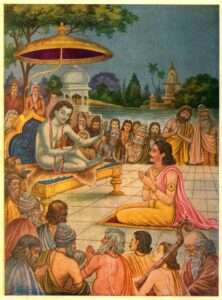One day, during a hunting trip, the virtuous king Pariksit arrived at the hut of the sage Samika and asked him to give him something to quench his thirst. But the latter, who was sitting in a yoga position and was closed within himself, enraptured by the ecstasy of a profound transcendental meditation, did not notice the king’s arrival, so, he did not move or open his eyes, which he kept closed to avoid being distracted by external things.
Pariksit was exhausted, and in addition, for hours he had been tormented by an unbearable thirst, so his mental state was altered. Certainly, he was not predisposed to kindness and cordiality, qualities that usually distinguished him. He kept calling him without getting an answer.
“This Rishi ignores the most elementary rules of hospitality”, he thought, “and does not care at all about me. He has no desire to fulfill his duties and for this he pretends to be immersed in his meditation. But I will teach him to respect his king”.
Without thinking about the serious mistake he was about to commit, he took a dead snake with the tip of his bow and placed it around his neck as a wreath. Then he went away in a rage.
What made Pariksit behave in this unfair way? He was not just any man but a pure devotee of the Lord and had always been in full possession of his intellectual faculties; was it possible that a simple state of fatigue could have troubled him up to that point? Certainly, that day he was pushed by something superior to act so improperly.
The wise Samika had not yet awakened from his reflections when a boy who was a friend of Sringi, his son, passed by his modest hut. Sringi, as virtuous as he was, had a terribly fiery and impulsive temperament, and could hardly control his emotions. At this point, it will be easy for you to imagine his reaction when, warned by his friend, he rushed to the place. Sringi was young, but thanks to his father’s teachings he had already developed strong mystical powers, so in meditation, he was able to reconstruct what had happened. Then, without even waiting for his father to open his eyes, he decided to avenge the insult.
“These Kshatriyas are blinded by the riches and respect the people bestow upon them”, he hissed, “and too often they forget that everything they possess is owed to the blessings and wisdom that we Brahmanas lavishly give to all without wanting anything in return. This Pariksit has now passed the mark; by offending my father who was innocent, he deserves death”.
Without reflecting on the serious consequences that might result, he sanctified water and concentrated on reciting the Vedic mantras. Then in a solemn tone he said:
“Exactly in seven days, the coward who dared to outrage my father with a dead reptile wreath will die of a snake bite”.
When the wise Samika woke up, he found his son in front of him, who, with tears in his eyes, informed him of the whole incident. The father’s reaction was immediate.
“What have you done?” he asked to his son. “Don’t you realize that Pariksit is the holiest monarch in the world and that our serenity depends on his protection? For such an insignificant offense you have led the whole world to a catastrophe. When society finds itself deprived of pure and honest guidance, everyone suffers and the peace is shattered. Unfortunately, when a Brahmana, even if young and unconscious like you, utters a curse it is bound to have an effect. I will warn Pariksit and will do everything in my power to save him.”
That same day one of Samika’s disciples went to Hastinapura, the capital, and told the king about the latest events.
King Pariksit felt very distressed, and shaking his head, said:
“I accept the curse of that young man as a true blessing. In fact, from the day I dared to mistreat a saint so rudely, I have not had any more peace within me. I am happy to pay my debt in this way. I will await death with serenity, aware that in this way I will have the opportunity to atone for my sin”.
Not everyone can know the exact moment of their death, and in this sense, Pariksit could consider himself lucky because he had the opportunity to spend those last seven days he had left to living in the best possible way: retired on the banks of the Ganges, he took the opportunity of the presence of Shukadeva Gosvami to listen to the sacred scripture called Srimad-Bhagavatam up to the last moment.
And punctually, after seven days, the serpent Takshaka infused him with its venom and the king abandoned his mortal remains.
This is a section of the book “Maha-bharata, Vol. 1”.
To buy the complete book, click above
Post view 516 times




Leave a Reply